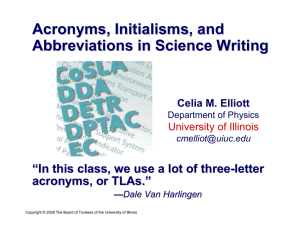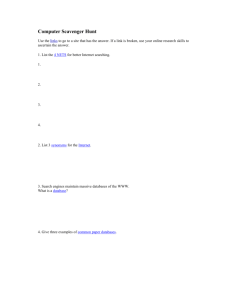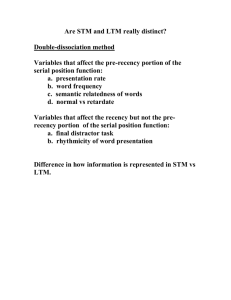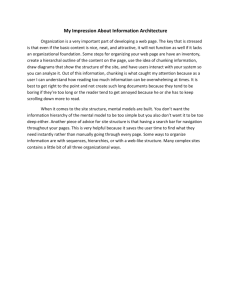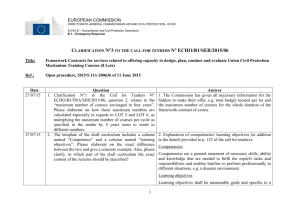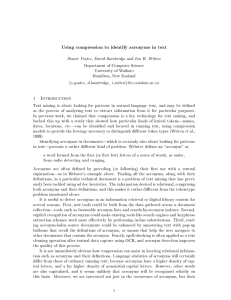The Memory Systems
advertisement
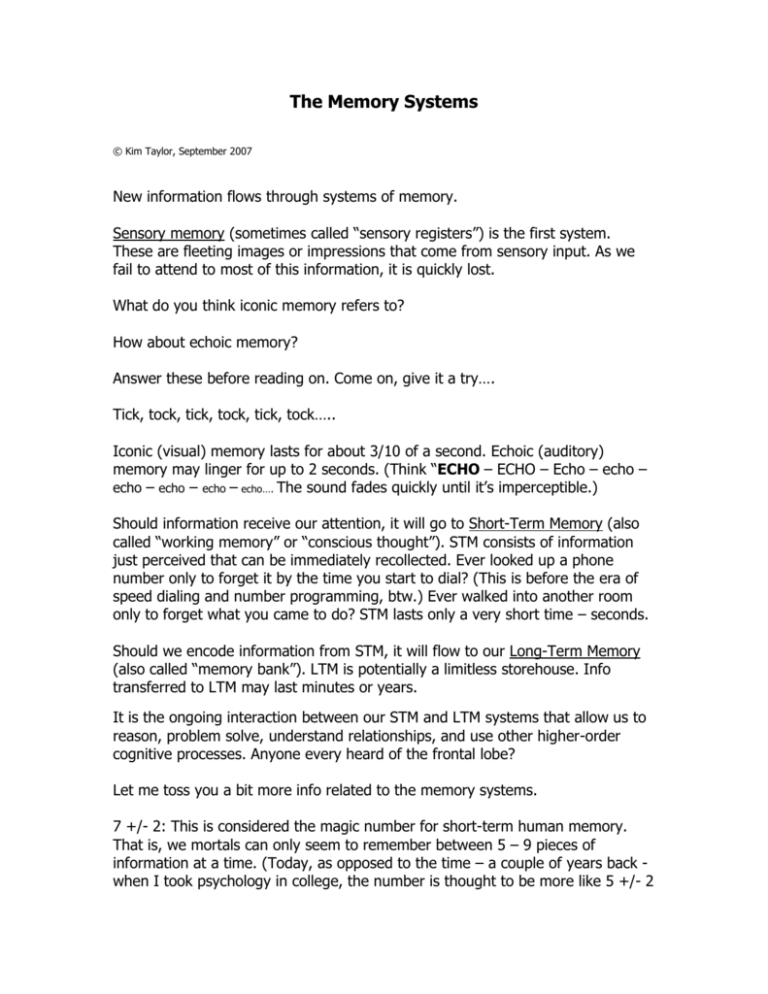
The Memory Systems © Kim Taylor, September 2007 New information flows through systems of memory. Sensory memory (sometimes called “sensory registers”) is the first system. These are fleeting images or impressions that come from sensory input. As we fail to attend to most of this information, it is quickly lost. What do you think iconic memory refers to? How about echoic memory? Answer these before reading on. Come on, give it a try…. Tick, tock, tick, tock, tick, tock….. Iconic (visual) memory lasts for about 3/10 of a second. Echoic (auditory) memory may linger for up to 2 seconds. (Think “ECHO – ECHO – Echo – echo – echo – echo – echo – echo…. The sound fades quickly until it’s imperceptible.) Should information receive our attention, it will go to Short-Term Memory (also called “working memory” or “conscious thought”). STM consists of information just perceived that can be immediately recollected. Ever looked up a phone number only to forget it by the time you start to dial? (This is before the era of speed dialing and number programming, btw.) Ever walked into another room only to forget what you came to do? STM lasts only a very short time – seconds. Should we encode information from STM, it will flow to our Long-Term Memory (also called “memory bank”). LTM is potentially a limitless storehouse. Info transferred to LTM may last minutes or years. It is the ongoing interaction between our STM and LTM systems that allow us to reason, problem solve, understand relationships, and use other higher-order cognitive processes. Anyone every heard of the frontal lobe? Let me toss you a bit more info related to the memory systems. 7 +/- 2: This is considered the magic number for short-term human memory. That is, we mortals can only seem to remember between 5 – 9 pieces of information at a time. (Today, as opposed to the time – a couple of years back when I took psychology in college, the number is thought to be more like 5 +/- 2 or 3 to 5 pieces of info.) How is it then, that a person can remember a 9-digit social security number, a 10-digit student ID number, a 10-digit phone number (including area code), or a 16-digit credit card number? If you needed to remember pi (3.14159265358979323846….), how could you do so? The answer is chunking. (“Chunking? Say it isn’t so, Kim Taylor. And tell me what the heck chunking is because I’m getting a visual that I don’t like….”) Call me at 509-533-3583 and I’ll talk you through the visual. It’ll be okay, I promise. Notice the layout of phone number. Think about how a social security number is written? How about that number on your AmEx? I chunked the 10 individual (and totally unconnected) numbers of my office phone into three pieces of info. Major credit card numbers (except for Discover) are chunked into 4 pieces. Socials are chunked into 3 pieces. We all chunk. Yes, it’s true. Reality hurts, though it’s important that you progress toward admission and acceptance; it’s for your own good. What types of information (other than numbers) do you chunk? Give some specific examples. Better yet, create a list of 15 simple, unrelated words. Practice chunking so that you can remember them all. Mnemonic devices: These are memory devices. There are many mnemonic devices including clustering, method of loci, narrative story, peg-word system, etc. (You’re going to have to do some work if you want to know what these are.) I will, however, explain a couple of the more commonly used mnemonic devices: acrostics and acronyms. In an acrostic, the first letter of each word in a sentence or phrase serves as a cue for a piece of specific information. So, let’s say that you wanted to remember the major sleep disorders in preparation for your test in Abnormal Psychology class. (Breaking News! Psych 215: Abnormal Psychology will be offered for the first time, ever, right here at SFCC, next quarter – Winter ’08. Kim Taylor will be the instructor. College cannot get any better than an entire quarter of mental disorders….) The disorders or conditions that you want to remember are: Insomnia, Narcolepsy, Apnea, (Sleep) Terrors, Somnambulism (sleep walking) and Somniloquy (sleep talking). Create an acrostic to help you remember these. (They need not be in the order presented.) An acronym is an abbreviation of sorts in which each letter represents a word of a name. Some common acronyms that you likely know include SFCC, FBI, CIA, IRS, NASA, etc. Do you know that SONAR is an acronym? RADAR? The word ACRONYM is actually an acronym that stands for A Coded Rendition Of Name Yielding Meaning. The Chemical Dependency Counseling uses a lot of acronyms: HALT – Hungry, Angry, Lonely, Tired (represent addiction relapse triggers) EGO – Easing God Out Here are a few of my favorite acronyms: HOMES – Heron, Ontario, Michigan, Erie, Superior (the Great Lakes) FEAR – False Expectations Appearing Real or Forget Everything And Run DENIAL – Don’t Even Notice that I Am Lying (to myself) You get the idea. To practice, I’d like you to take your initials (First, Middle, Last), creating an acronym that reflects your personality. First Initial Middle Initial Last Initial ___ ___ ___ Acronym using my initials that reflects my personality: _____________ _____________ _____________ To end this lesson, I’m going to give some terms. I want you to tell me the first word that comes to mind. Oops…. wrong lecture. Seriously, I want to see how well you do at figuring out (use your frontal lobe and reasoning skills) what these memory terms might mean. Ready? Come on, humor me and play along…. Procedural memory. This type of memory is slow to acquire, though very enduring. Define and give some examples. Declarative memory. This memory is quick to acquire though easily susceptible to forgetting. Define and give some examples. Within declarative memory, you might hear the terms “episodic memory” and “semantic memory”. As both of these (episodic and semantic memory) are processed coherently – that is, we learn facts within episodes – it’s difficult to distinguish between the two. Explicit memory. Define and give examples. Implicit memory. Define and give examples. False Memory. Define…. State-Dependent Memory. You get the idea…. Flashbulb Memory. ….
